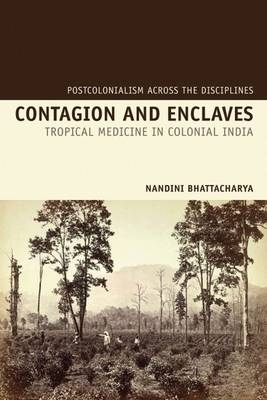
Contagion and Enclaves
Tropical Medicine in Colonial India
Seiten
2012
Liverpool University Press (Verlag)
978-1-84631-829-0 (ISBN)
Liverpool University Press (Verlag)
978-1-84631-829-0 (ISBN)
An Open Access edition of this book is available on the Liverpool University Press website and the OAPEN library.
Colonialism created exclusive economic and segregatory social spaces for the exploitation and management of natural and human resources, in the form of plantations, ports, mining towns, hill stations, civil lines and new urban centres for Europeans. Contagion and Enclaves studies the social history of medicine within two intersecting enclaves in colonial India; the hill station of Darjeeling which incorporated the sanitarian and racial norms of the British Raj; and in the adjacent tea plantations of North Bengal, which produced tea for the global market. This book studies the demographic and environmental transformation of the region: the racialization of urban spaces and its contestations, establishment of hill sanatoria, expansion of tea cultivation, labour emigration and the paternalistic modes of healthcare in the plantation. It examines how the threat of epidemics and riots informed the conflictual relationship between the plantations with the adjacent agricultural villages and district towns. It reveals how Tropical Medicine was practised in its ‘field’; researches in malaria, hookworm, dysentery, cholera and leprosy were informed by investigations here, and the exigencies of the colonial state, private entrepreneurship, and municipal governance subverted their implementation. Contagion and Enclaves establishes the vital link between medicine, the political economy and the social history of colonialism. It demonstrates that while enclaves were essential and distinctive sites of articulation of colonial power and economy, they were not isolated sites. The book shows that the critical aspect of the enclaves was in their interconnectedness; with other enclaves, with the global economy and international medical research.
Colonialism created exclusive economic and segregatory social spaces for the exploitation and management of natural and human resources, in the form of plantations, ports, mining towns, hill stations, civil lines and new urban centres for Europeans. Contagion and Enclaves studies the social history of medicine within two intersecting enclaves in colonial India; the hill station of Darjeeling which incorporated the sanitarian and racial norms of the British Raj; and in the adjacent tea plantations of North Bengal, which produced tea for the global market. This book studies the demographic and environmental transformation of the region: the racialization of urban spaces and its contestations, establishment of hill sanatoria, expansion of tea cultivation, labour emigration and the paternalistic modes of healthcare in the plantation. It examines how the threat of epidemics and riots informed the conflictual relationship between the plantations with the adjacent agricultural villages and district towns. It reveals how Tropical Medicine was practised in its ‘field’; researches in malaria, hookworm, dysentery, cholera and leprosy were informed by investigations here, and the exigencies of the colonial state, private entrepreneurship, and municipal governance subverted their implementation. Contagion and Enclaves establishes the vital link between medicine, the political economy and the social history of colonialism. It demonstrates that while enclaves were essential and distinctive sites of articulation of colonial power and economy, they were not isolated sites. The book shows that the critical aspect of the enclaves was in their interconnectedness; with other enclaves, with the global economy and international medical research.
Dr Nandini Bhattacharya is Wellcome Post-Doctoral Research Fellow at the University of Leicester.
List of Illustrations
List of Tables
Acknowledgements
List of Abbreviations
1. Disease and Colonial Enclaves
2. The Sanatorium of Darjeeling: European Health in a Tropical Enclave
3. Pioneering Years in Plantation and Medicine in Darjeeling, Terai and Duars
4. The Sanatorium Enclave: Climate and Class in Colonial Darjeeling
5. Contending Visions of Health Care in the Plantation Enclaves
6. The Plantation Enclave, the Colonial State and Labour Health Care
7. Tropical Medicine in Its ‘Field’: Malaria, Hookworm and the Rhetoric of the ‘Local’
8. Habitation and Health in Colonial Enclaves: The Hill-station and the Tea Plantations
Bibliography
Index
| Erscheint lt. Verlag | 20.11.2012 |
|---|---|
| Reihe/Serie | Postcolonialism Across the Disciplines ; 10 |
| Verlagsort | Liverpool |
| Sprache | englisch |
| Maße | 163 x 239 mm |
| Themenwelt | Geschichte ► Teilgebiete der Geschichte ► Wirtschaftsgeschichte |
| Medizin / Pharmazie ► Medizinische Fachgebiete ► Mikrobiologie / Infektologie / Reisemedizin | |
| Studium ► Querschnittsbereiche ► Geschichte / Ethik der Medizin | |
| ISBN-10 | 1-84631-829-7 / 1846318297 |
| ISBN-13 | 978-1-84631-829-0 / 9781846318290 |
| Zustand | Neuware |
| Haben Sie eine Frage zum Produkt? |
Mehr entdecken
aus dem Bereich
aus dem Bereich
die Ukraine, Polen und der Irrweg in der russischen Geschichte
Buch | Hardcover (2023)
C.H.Beck (Verlag)
28,00 €


